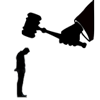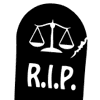 Dismissal |
Grievances may be dismissed for lack of merit at several stages. If Disciplinary Counsel finds the complaint to be frivolous or an initial investigation fails to support the accusation, he may dismiss it if the Contact Member of the Hearing Committee concurs. And, while dismissals are less common at later stages, the Board on Professional Responsibility or the Court of Appeals will dismiss cases which fail to establish an attorney's incapacity or professional misconduct. | |
 Diversion |
Absent willful or dishonest conduct, the attorney may enter into a written agreement with Disciplinary Counsel to rectify the problem. With Board member approval, such diversion agreements specify the required remedial action. If the lawyer meets these requirements, Disciplinary Counsel will close the case without formal charges. | |

Informal Admonition |
With the approval of a member of the Board's Hearing Committee, Disciplinary Counsel may directly admonish the attorney in a letter addressing the lawyer's misconduct. This may be the "lightest" of available sanctions, this supposedly "informal" rebuke is a matter of public record which may follow the attorney for the remainder of his career. The rules do not provide for a "private" admonition or reprimand. If a lawyer refuses to accept such an admonition, the admonition will be vacated and Disciplinary Counsel will institute formal charges. | |
|
|
If the Board concludes that the lawyer’s misconduct warrants a reprimand, they may recommend that such a sanction be imposed and, unless the lawyer takes exception to it in the Court of Appeals, will publicly reprimand the attorney. | |
 Censure |
Once Disciplinary Counsel files a petition to initiate formal charges, the Court of Appeals may censure the attorney for professional misconduct that does not warrant a suspension or disbarment. Because this is issued by the high court, a censure is considered to be more serious than an informal admonition or reprimand. But, in all three of these cases, the sanction will not preclude the attorney from continuing to practice law. | |
 Suspension |
Depending on the severity of the infraction, the Board or, if challenged, the Court of Appeals may suspend an attorney's privilege to practice law, either for a specified period or indefinitely. Since the attorney may not practice law during this period, a suspension of any significant duration can put a law firm out of business. | |
 Disbarment |
The equivalent of the death penalty in disciplinary proceedings, disbarments are reserved for the most serious instances of professional misconduct. The most common infractions leading to disbarment include stealing client escrow accounts, convictions for fraud and other major crimes, and multiple instances of willful misconduct that reflect adversely on an attorney's honesty, competence and fitness to practice law. | |
 Reinstatement |
It won't work for everyone. But for those who successfully petition for reinstatement to the bar, there really is life after death. Because the petitioner must prove the requisite character and fitness to resume the practice of law, the petition must include a simple narrative statement of the alleged material facts to be established by clear and convincing evidence concerning the attorney’s moral qualifications, competency, and learning in law required for readmission, as well as the material facts showing that the attorney’s resumption of the practice of law will not harm the public or the profession. |
